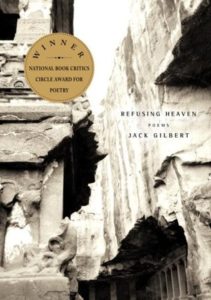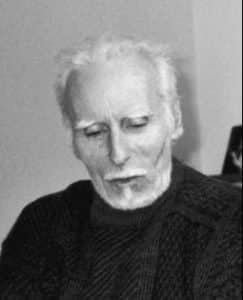We were in Chicago for a concert. Actually, the concert was in the northern suburb of Evanston, home of Northwestern University, and our hotel was in nearby Skokie. Across the interstate from the hotel was a rather large shopping center, which had a Barnes & Noble bookstore, which necessitated a visit. Or two.
We browsed the bookstore one chilly autumn afternoon, when the store was nearly empty. The literature and poetry sections were on the lower, basement level. I remember seeing a table loaded with a sale of Winston Graham’s Poldark books, the television series then all the rage on PBS. The poetry section was rather large, larger than what I was used to seeing at a Barnes & Noble. I browsed and browsed, gradually finding a stack of books in my arms.
One of those books was Refusing Heaven by Jack Gilbert (1925-2012). It had been published in 2005, more than a decade before that fall of 2016, and the copy in my hands was a third printing edition that looked brand-new (imagine three editions of a poetry collection in the same year). I had a copy of his Collected Poems (2014) at home, which included the poems of Refusing Heaven. I didn’t need to buy the copy in front of me. I was intrigued by its just-off-the-press condition—the book didn’t have a bit of wear on it.
You probably can guess the outcome. I did get a discount with my B&N membership.
The collection was published when Gilbert was 80. He died in 2012, after battling Alzheimer’s for many years. I don’t know whether he was experiencing the effects of the disease when Refusing Heaven was published. It’s a beautiful volume, its 87 poems filled with the experience, occasional sadness and regret, and sense of loss that often come with age. And memory—the idea of memory saturates these poems.
As I read the poems about the loss of friends and lovers, I think of my mother, who joyfully went to her high school reunion every year for more than 60 years, until nearly everyone in her class of 1940 at John McDonough High School in New Orleans had died. I believe she was the last of two graduates when she died in 2014. They didn’t meet any longer; they simply exchanged Christmas cards.
These poems suggest that Gilbert is writing down the things he doesn’t want forgotten—the hotels of Paris that have disappeared, the women he’s known and loved, a Halloween of long ago, and regrets. He mostly writes about relationships and people, because they are what seem to matter most.
Infidelity

They eat noodles for breakfast as usual.
For eleven years he thought it was the river
at the bottom of his mind dreaming.
Now he knows she is living inside him,
as the wind is sometimes visible
in the trees. As the roses and rhubarb
are in the garden and then not.
Her askes are by the sea in Kamakura.
Her face and hair and sweet body still
in the old villa on a mountain where
she lived the whole summer. They slept
on the floor for eleven years.
But now she comes less and less.

Jack Gilbert
Born in Pittsburgh, Gilbert is the author of several collections of poetry: Views of Jeopardy (1962); Monolithos Poems 1962 and 1982 (1982); The Great Fires: Poems, 1982-1992 (1994); Refusing Heaven (2005); Tough Heaven: Poems of Pittsburgh (2006); Transgressions: Selected Poems (2006); The Dance Most of All: Poems (2010); and Collected Poems (2014). He was the recipient of a Guggenheim Fellowship, a National Endowment for the Arts grant, and several other honors and recognitions.
I read Refusing Heaven and I think of a fine poet writing about what’s important. I think of my mother, who lived in my childhood home for almost 58 years. I think of the few boxes of family photographs, some going back to the early 19th century, wrapped in acid-free tissue in storage boxes in my basement. I read these poems and I consider what’s important and what always matters the most in each life—the people we know and love, the people who shape and mold us, and the people we don’t want forgotten.
Photo by mypubliclands, Creative Commons, via Flickr. Post by Glynn Young, author of the novels Dancing Priest, A Light Shining, and the newly published Dancing King, and Poetry at Work.
__________________________

“I require all our incoming poetry students-in the MFA I direct-to buy and read this book.”
-Jeanetta Calhoun Mish
- “Horace: Poet on a Volcano” by Peter Stothard - September 16, 2025
- Poets and Poems: The Three Collections of Pasquale Trozzolo - September 11, 2025
- Poets and Poems: Boris Dralyuk and “My Hollywood” - September 9, 2025

Maureen says
One of my favorite poets. I’ve read ‘Refusing Heaven’ more times than I can recall.
Glynn says
I’ve now read it twice. It’s a beautiful collection.
Donna Falcone says
I remember Liz Gilbert shared a quote of his that spoke to me – so I painted it. http://www.donnazfalcone.com/uploads/2/5/5/9/25593356/6826448_orig.jpg
Thank you Glynn. This poem that you shared by Gilbert is so moving… I think I’ll look for that book in my library. 🙂
Glynn says
Beautiful artwork!
Donna Falcone says
thanks!
Katie says
Donna,
Thank you for sharing your art!
Gratefully,
Katie
Sandra Heska King says
I just put this on hold at the library–it will need to travel from another branch.
I did have to smile at the book description… “of a life spent in luminous understanding of his own blessings and shortcomings.”
Donna Falcone says
I’m stunned that my library has it! I know what I’ll be swinging by to snag tomorrow…. or possibly today if there’s time.
Glynn says
Sandra – At least they didn’t call the collection oracular.
Glynn says
Or breathtaking.
Katie says
“These poems suggest that Gilbert is writing down the things he doesn’t want forgotten – …he mostly writes about relationships and people, because they are what seem to matter most.”
Ah, a poet I will treasure:)